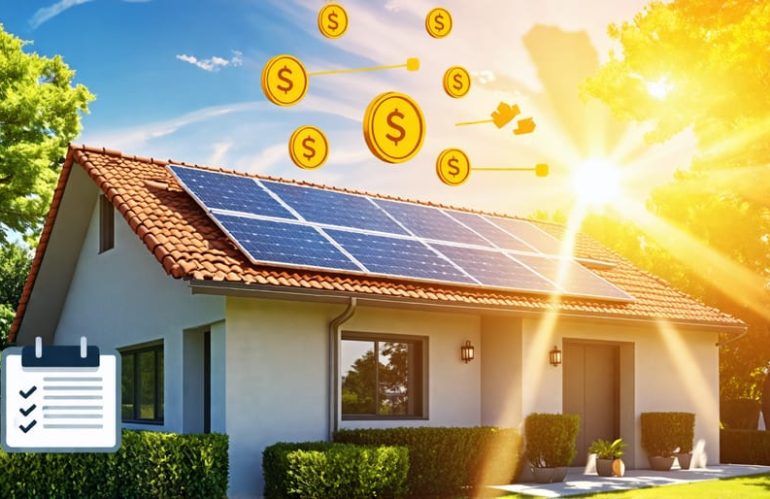Ensure compliance with OSHA by following these key steps for solar panel safety. First, thoroughly assess the worksite for potential fall hazards, using personal fall arrest systems where necessary. Second, verify all workers engaged in solar panel installation hold the required training and certification, boosting competency and confidence. Third, conduct routine equipment inspections to detect any defects or wear that may compromise safety. Lastly, educate homeowners on OSHA’s guidelines to debunk myths and highlight financial incentives tied…
Category: Blog
Unlocking the Mystery of Maximum PV Open Circuit Voltage for Optimal Solar Efficiency
Monitor your solar panel’s open circuit voltage (Voc) regularly to ensure optimal performance and detect any anomalies early. Adjust the position and tilt of your solar panels to maximize sun exposure, minimizing potential voltage loss and boosting efficiency. Evaluate your inverter capacity to accommodate the maximum Voc without surpassing its limits, which can prevent potential damage and inefficiencies. Consider installing a charge controller that matches the Voc requirements of your system, safeguarding your investment and enhancing energy output.
Understanding PV Open Circuit Voltage
What is Open Circuit Voltage…
Do Dirty Solar Panels Really Cost You More? Here’s What You Need to Know.
Inspect solar panels regularly to identify dust, bird droppings, or debris that might hinder performance. Use soft sponges or microfiber cloths to gently wipe the panel surface, avoiding abrasive materials that could scratch the glass. Schedule cleanings quarterly, especially after seasonal changes or inclement weather, to maintain optimal efficiency. Consider hiring professional cleaning services for hard-to-reach panels, ensuring thorough and safe maintenance.
The Basics of Solar Panel Efficiency
Solar panels work by capturing sunlight and converting it into electricity. This transformation begins with photovoltaic cells…
Harness Free Sunlight: Get Financially Rewarded with Solar Panel Grants
Explore government and local grants designed to offset the cost of residential solar panel installations. Research state-specific programs and utility company incentives that might be available in your area to maximize savings. Apply for federal tax credits, such as the Investment Tax Credit (ITC), which can significantly reduce your solar panel costs. Consult with solar installation professionals who can guide you through the grant application process and provide insights into less-known financial aid options. Prioritize these steps to not only save money but also contribute to a sustainable future.
Understanding Solar Panel …
Could California’s Solar Tax Incentives Save You Thousands? Here’s What You Need to Know
Unlock significant savings by taking advantage of tax incentives for solar panels in California. First, apply for the Federal Investment Tax Credit, offering a 30% deduction on your solar installation costs, to reduce your federal tax liability directly. Next, explore the California Solar Initiative (CSI) for potential rebates on your solar purchase depending on your location and utility provider. Check eligibility and apply promptly as funds are limited. Don’t overlook the Net Energy Metering (NEM) policy, which allows you to earn credits on your electricity bill for excess energy your system generates. Finally, understand the …
How Solar Panel Integration Can Revolutionize Your Home’s Efficiency
Determine your home’s energy needs by assessing current electricity bills and considering future consumption trends. Note your roof’s orientation, size, and shading to gauge solar panel efficiency. Choose a reputable installer with proven experience in residential solar power systems to ensure quality installation and seamless integration. Explore available incentives and financing options, such as tax credits or leasing plans, to optimize financial benefits and enhance return on investment.
What …
The Future of Solar Panels: Boosting Efficiency and Your Savings
Explore high-efficiency solar panels to maximize your home’s energy savings. Assess innovations like tandem solar cells, which optimize light absorption by layering materials with varied band gaps. Monitor advancements in perovskite-based panels, poised to surpass traditional silicon by boosting efficiency and lowering costs. Evaluate your current energy usage and future-proof your setup by preparing for smart-grid integrations and energy storage solutions. Reap the solar power benefits that lead to reduced …
Maximize Your Home’s Energy Savings with a Solar Panel Backup Battery
Maximize your home’s energy efficiency by installing solar panels in tandem with a solar panel backup battery system. Assess your home’s energy needs to determine the appropriate battery size that can cover essential devices during power outages, bolstering your energy security while enhancing your sustainable living practices. Evaluate your local climate and sunlight availability to ensure optimal battery performance and longevity, making the most of your investment. Explore financial incentives and local grants that can significantly offset initial costs, making this transition both eco-friendly and economically wise. Learn …
Power Your Home Smarter: How Solar Panels and the National Grid Work Together
Maximize your solar investment by connecting your solar panels to the national grid. Slash energy bills with net metering by selling excess power back to the grid, effectively earning credit and lowering monthly expenses. Optimize your system’s efficiency by monitoring energy usage, ensuring solar panels produce maximum output for your household and grid contributions. Research available incentives, such as tax credits and rebates, that enhance financial benefits, making the initial investment more feasible. Educate yourself on common myths like limited energy production during cloudy days; modern solar systems efficiently harness energy…
Unlock Savings and Sustainability: How Inverters Transform Your Solar Panel System
Optimize your solar energy investment by selecting the right inverter for your solar panel system. Start by evaluating the size and energy requirements of your home to ensure a perfect match between your inverter and panel output. Choose between string inverters for simplicity and ease of installation, or opt for microinverters for enhanced efficiency and performance, especially if shading is a concern. Prioritize an inverter with a high efficiency rating to maximize energy conversion and minimize losses, directly cutting …










